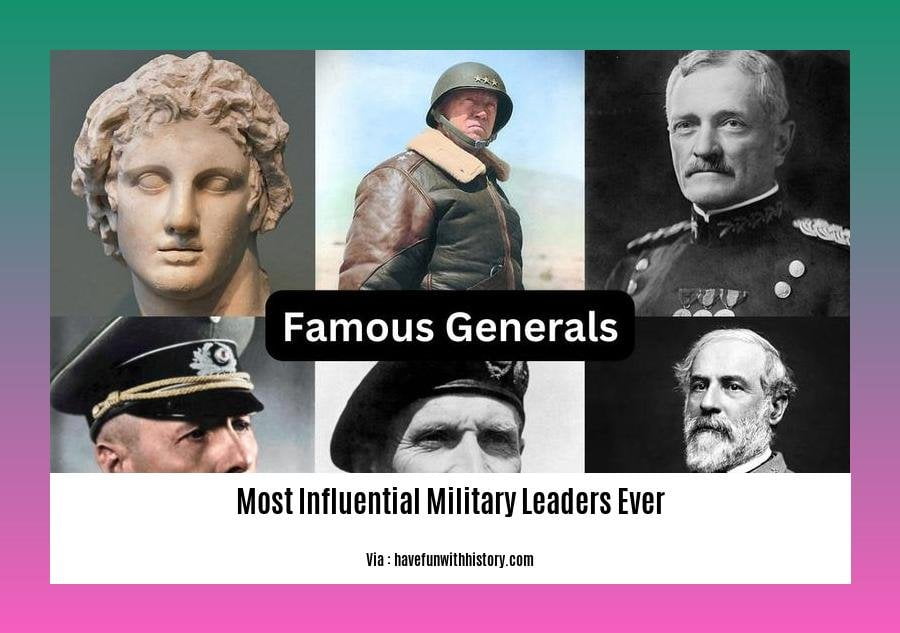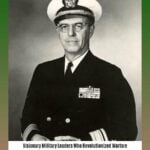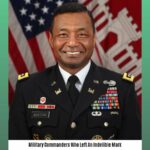Step into the annals of military history and prepare to encounter the titans of combat strategy and leadership in [10 Most Influential Military Leaders Ever]. From the battlefields of ancient Greece to the trenches of modern warfare, we unveil the minds and tactics of those who have shaped the destiny of nations and forever etched their names in the tapestry of time.
Key Takeaways:
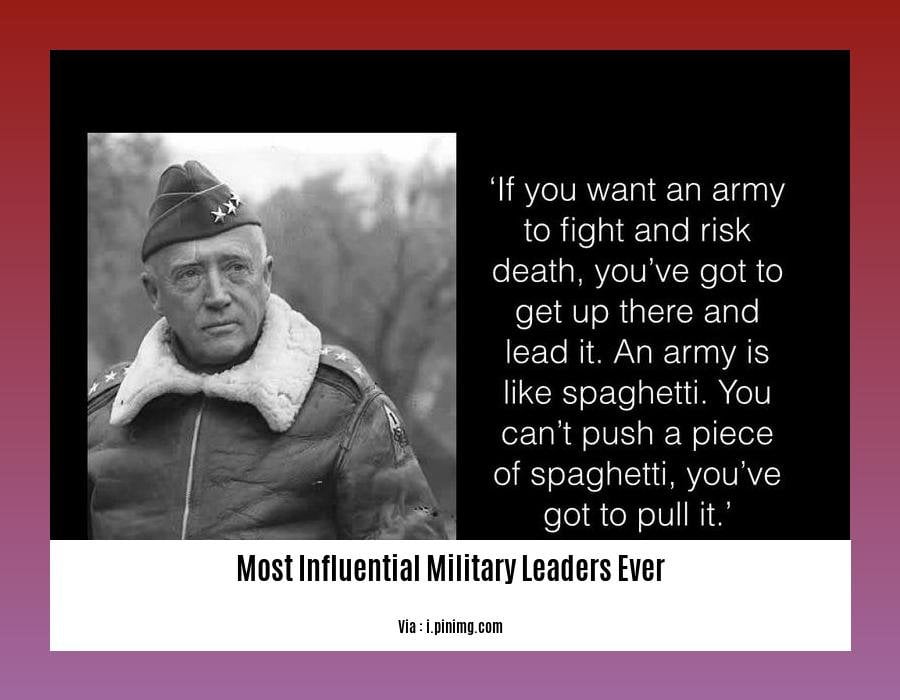
- Military leaders have employed cunning and ruthless strategies that continue to influence modern tactics.
- Influential military leaders include:
- Napoleon Bonaparte: Revolutionized military tactics.
- Julius Caesar: Conquered Gaul.
- Genghis Khan: Established the largest contiguous empire.
- Alexander the Great: Conquered a vast empire by 32.
- Sun Tzu: Chinese military strategist.
- George Patton: Aggressive World War II general.
- Horatio Nelson: Crucial naval leader against Napoleon.
Most Influential Military Leaders Ever
Prepare to be awestruck as we delve into the lives of the most influential military leaders ever. These legendary figures have left an unparalleled mark on warfare, shaping the destiny of nations and influencing tactics that echo to this day.
Ancient Warriors
- Alexander the Great (Macedonia): A military maestro, he conquered vast territories, unifying Greece and leaving a legacy that continues to inspire.
- Julius Caesar (Rome): Not just a brilliant general but also a cunning politician, Caesar expanded the Roman Empire, revolutionizing warfare in its wake.
- Hannibal (Carthage): Renowned for his military brilliance and daring use of elephants, Hannibal’s legendary tactics and strategies still captivate military minds today.
Medieval Masterminds
- Genghis Khan (Mongols): The founder of the Mongol Empire, Genghis Khan was a formidable conqueror, instilling fear and admiration for his military prowess.
- William the Conqueror (Normandy): His conquest of England heralded a new era of feudalism, transforming the face of medieval warfare.
- Joan of Arc (France): This peasant girl turned military icon inspired French troops to victory, becoming a beacon of hope and courage during the Hundred Years’ War.
Renaissance and Early Modern Era
- Frederick the Great (Prussia): A brilliant strategist and military reformer, Frederick the Great led Prussia to unprecedented heights, establishing its status as a formidable military power.
- Napoleon Bonaparte (France): A legendary general whose innovative tactics and campaigns conquered much of Europe, cementing his place as one of the greatest military minds in history.
- Horatio Nelson (Great Britain): An inventive naval commander, Nelson’s victories at Trafalgar and the Nile showcased his mastery of naval warfare, ensuring British naval supremacy.
Modern and Contemporary Leaders
- George Patton (United States): Known for his aggressive and audacious tactics, Patton played a pivotal role in World War II, becoming an icon of American military prowess.
- Dwight D. Eisenhower (United States): As the Supreme Allied Commander in Europe during World War II, Eisenhower masterminded the D-Day invasion, leading the Allied forces to victory.
- Moshe Dayan (Israel): A brilliant strategist and politician, Dayan played a crucial role in Israel’s wars and peace negotiations, shaping the nation’s military and political landscape.
Discover the greatest military commanders of all time, whose strategic brilliance and unwavering leadership left an everlasting legacy on the annals of warfare. From the legendary Alexander the Great to the enigmatic Napoleon Bonaparte, these masterminds of combat changed the course of history.
Prepare to be awestruck by the history’s preeminent military geniuses, who revolutionized warfare with their innovative tactics and indomitable spirits. Witness the rise of iconic figures such as Julius Caesar, Hannibal, and Sun Tzu, whose military prowess still inspires awe today.
Join us on a captivating journey to explore the lives and achievements of military commanders who left an indelible mark on the world stage. These extraordinary individuals, from Frederick the Great to George Patton, demonstrated unparalleled courage, cunning, and vision, shaping the destiny of nations through their strategic brilliance.
Napoleon Bonaparte: Revolutionizing Warfare and Conquering Much of Europe
Napoleon Bonaparte, a military genius, emerged during the French Revolution and left an indelible mark on warfare and European history. His innovative tactics, decisive victories, and unwavering ambition propelled him to become one of the most influential military leaders of all time.
From his early triumphs in Italy to his coronation as Emperor of France, Napoleon’s campaigns reshaped the political landscape of Europe. He revolutionized warfare by introducing new artillery techniques, implementing conscription, and emphasizing mobility and maneuverability. His victories at Austerlitz, Jena-Auerstedt, and Wagram are testaments to his strategic brilliance and battlefield prowess.
Napoleon’s conquests extended from the Iberian Peninsula to the Russian heartland, stretching French influence across much of Europe. His military campaigns not only determined the fate of nations but also sowed the seeds of nationalism and sparked the rise of new powers.
Key Takeaways:
- Napoleon’s innovative tactics and use of artillery gave French armies a decisive edge.
- He introduced conscription to create a massive and disciplined fighting force.
- Napoleon’s emphasis on mobility and maneuverability revolutionized warfare.
- His victories at Austerlitz, Jena-Auerstedt, and Wagram showcased his strategic brilliance.
- Napoleon’s conquests reshaped the political map of Europe and fostered nationalism.
Most Relevant URL Source:
- Napoleon Bonaparte – Biography, Facts & Death from HISTORY.com
Patton: Aggressive Tactics and Pivotal Role in World War II
George Patton: A daring and aggressive general, Patton played a crucial role in Allied victory during World War II.
Patton’s bold tactics and unwavering determination earned him a reputation as a fearless leader. He believed in attacking relentlessly, even when faced with overwhelming odds. His aggressive approach proved effective, particularly during the pivotal Battle of the Bulge.
Beyond his battlefield prowess, Patton was a master of logistics and organization. He meticulously planned his campaigns, ensuring that his troops were well-equipped and supplied. His ability to motivate and inspire his men made him a formidable force on the battlefield.
Key Takeaways:
- Patton’s aggressive tactics were instrumental in Allied victories during World War II.
- He was a skilled strategist and logistician, ensuring his troops were prepared for battle.
- His ability to motivate and inspire his men made him a legendary leader.
Most Relevant URL Source:
Eisenhower: Coordinating the D-Day invasion and leading the Allied victory
Dwight D. Eisenhower was a brilliant military strategist and leader who played a pivotal role in the Allied victory in World War II. As the Supreme Allied Commander in Europe, Eisenhower was responsible for coordinating the massive D-Day invasion, which ultimately led to the liberation of Western Europe from Nazi Germany.
Eisenhower’s decision-making process and leadership style were crucial to the success of the D-Day invasion. He carefully considered all available intelligence and consulted with his advisors before making any major decisions. He was also able to motivate and inspire his troops, even in the face of adversity.
The D-Day invasion was a complex and risky operation, but Eisenhower’s leadership and planning ensured that it was ultimately a success. The invasion led to the liberation of France and the eventual defeat of Nazi Germany. Eisenhower’s role in the Allied victory is a testament to his skill as a military strategist and leader.
Key Takeaways:
- Eisenhower was a brilliant military strategist and leader.
- He was responsible for coordinating the D-Day invasion, which led to the Allied victory in World War II.
- His decision-making process and leadership style were crucial to the success of the invasion.
- Eisenhower’s legacy as a military leader is one of brilliance, courage, and determination.
Most Relevant URL Source:
- Eisenhower and D-Day
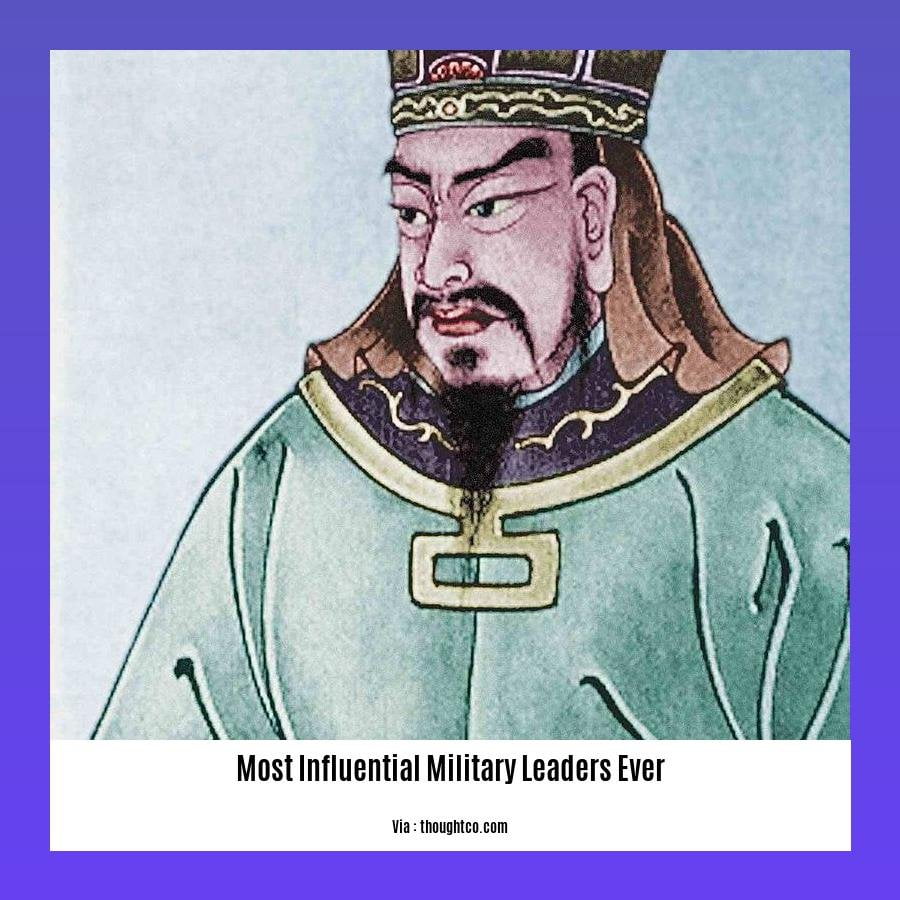
FAQ
Q1: Who is considered the most influential military leader in history?
A1: It is difficult to name a single most influential military leader, as many have made significant contributions to the art of warfare throughout history. However, some of the most notable include Napoleon Bonaparte, Julius Caesar, Genghis Khan, Alexander the Great, and Sun Tzu.
Q2: What qualities make a great military leader?
A2: Great military leaders possess a combination of strategic brilliance, tactical acumen, motivational skills, and the ability to inspire loyalty and discipline among their troops. They are also often adept at adapting to changing circumstances and exploiting their enemies’ weaknesses.
Q3: What are some of the most famous military campaigns in history?
A3: Some of the most famous military campaigns in history include the Battle of Marathon (490 BC), the Battle of Cannae (216 BC), the Battle of Alesia (52 BC), the Battle of Hastings (1066), the Battle of Gettysburg (1863), and the Battle of Stalingrad (1942-1943).
Q4: How has military strategy evolved over time?
A4: Military strategy has evolved over time as a result of technological advancements, changes in political and social conditions, and the development of new doctrines and tactics. In recent years, the focus has shifted towards asymmetric warfare, counterinsurgency, and the use of technology to gain an advantage over the enemy.
Q5: What are the key challenges facing military leaders today?
A5: Military leaders today face a number of challenges, including the rise of non-state actors, the proliferation of weapons of mass destruction, and the increasing complexity of the global security environment. They must also contend with the challenges of managing multinational coalitions, operating in cyber and space domains, and addressing the ethical implications of modern warfare.
